It was in 2009, when Barbara Lechner, an Austrian citizen, started preparing her ambitious project: The foundation of the Malaikha Organization, an international NGO with the main goal to build and open a big boarding school for blind children on international standard in Zambia.

Malaikha - School for the Blind in Zambia
by Malaikha
The Malaikha School, founded by an Austrian citizen, is an international boarding school, deep in the rural areas in the Southern Province of Zambia, close to Mazabuka town.
Deep in the Mwanachingwala chiefdom in the Southern Province of Zambia you would not expect to find a unique place like the Malaikha School for the Blind. Already build like a small village on its own, although the whole construction is far of being finished, you find the big Malaikha family consisting on teachers, class assistants, a cook, a manager, a director, volunteers, general workers, around 20 kids in all age groups and a lot of animals scurrying around. You can meet Mr. Mukanda Kanda and Mr. Naleshebo, the class assistants, walking around with their canes, since they are both blind themselves. You would meet Pink Rose, who is taking care of the nutritional requirements of the staff and her beloved children, who she treats like her own. You will meet Site Manager Doc as well as ten guys from the villages around, who are helping in the construction and the garden. And not at all you would expect finding a "Muzungu", a white person, there in the rural area, but founder and director of Malaikha is Barbara Lechner, an Austrian citizen, who fell in love with Zambia in 2007 and decided to choose this country for her ambitious project: A proper international boarding school for the African continent, where blind and visually impaired children with and without multiple disabilities can learn on a high standard to have the best chances to live as independently as possible afterwards. Barbara likes quoting Helen Keller, who was a blind and deaf writer and fighter for the blind and who lived from 1880 to 1968 and Helen Keller said: “The only thing worse than being blind is having sight but no vision.” Malaikha and Barbara Lechner definitely have a vision but unfortunately not enough support to realize it.
The school opened in September 2011. Kids in all age groups are enrolled because the youngest boy, Jackson, is three years while the oldest girl, Nancy, is already 29. 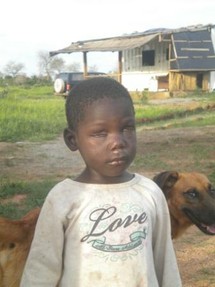 During the holidays Malaikha offers free training weeks for blind adults as well. The majority of the enrolled students never went to any school before. Those who were coming from other schools were all equally far behind in their education, some of them even came from a special unit at a government school and never had any mathematic lesson in over ten years there and were taught by a teacher who was not even a teacher degree. Also other students had bad experiences in former schools, mostly due lack of skills of the teachers, lack of materials or also lack of attention in former classes due to big numbers of pupils in each class. One child with additional cerebral palsy to her blindness was one term at a boarding school where she never bathed, simple because nobody helped her and she needs some special assistance for some daily tasks. Malaikha tries to keep the number of pupils in each class low and children are taught individually. Each child has his or her own individual earning program which is not classified into grades since the children should be picked up on the individual level where they stand when they arrive at Malaikha. The curriculum which is used was developed by Barbara herself and it is basically a mixture between different European curriculums for Blind and the Zambian curriculum in an adapted version for blind including the subjects art, music, mathematics, computer skills, language and literacy, sciences, sports, mobility and orientation and life skills.
During the holidays Malaikha offers free training weeks for blind adults as well. The majority of the enrolled students never went to any school before. Those who were coming from other schools were all equally far behind in their education, some of them even came from a special unit at a government school and never had any mathematic lesson in over ten years there and were taught by a teacher who was not even a teacher degree. Also other students had bad experiences in former schools, mostly due lack of skills of the teachers, lack of materials or also lack of attention in former classes due to big numbers of pupils in each class. One child with additional cerebral palsy to her blindness was one term at a boarding school where she never bathed, simple because nobody helped her and she needs some special assistance for some daily tasks. Malaikha tries to keep the number of pupils in each class low and children are taught individually. Each child has his or her own individual earning program which is not classified into grades since the children should be picked up on the individual level where they stand when they arrive at Malaikha. The curriculum which is used was developed by Barbara herself and it is basically a mixture between different European curriculums for Blind and the Zambian curriculum in an adapted version for blind including the subjects art, music, mathematics, computer skills, language and literacy, sciences, sports, mobility and orientation and life skills.
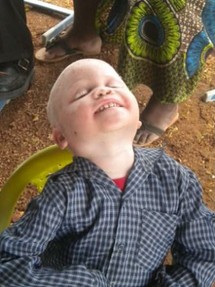 One of the kids at school is Junior. He is very active little Albino boy. Albinos are visually impaired when they are born. Luckily Malaikha found Junior already when he was only 2 years old and always provided him with sun glasses and sun cream. Because of always wearing sun glasses, his eyes did not get damaged too much and his vision is still quite well. Even when he was a toddler, Junior treated his sun glasses like a very special thing, because when he got his first pair in 2009, it was also the very first time he could actually see his friends when playing outside his hut in his village. Unfortunately Junior did not have a very nice life when he was a baby. His mother felt disgusted by the little Albino child and did not want to keep him. She refused to feed him or lift him up. Luckily, Junior has a very caring father who brought him up and now he even has a whole second family at Malaikha. Junior loves going to school and he even calls Barbara his mother lately.
One of the kids at school is Junior. He is very active little Albino boy. Albinos are visually impaired when they are born. Luckily Malaikha found Junior already when he was only 2 years old and always provided him with sun glasses and sun cream. Because of always wearing sun glasses, his eyes did not get damaged too much and his vision is still quite well. Even when he was a toddler, Junior treated his sun glasses like a very special thing, because when he got his first pair in 2009, it was also the very first time he could actually see his friends when playing outside his hut in his village. Unfortunately Junior did not have a very nice life when he was a baby. His mother felt disgusted by the little Albino child and did not want to keep him. She refused to feed him or lift him up. Luckily, Junior has a very caring father who brought him up and now he even has a whole second family at Malaikha. Junior loves going to school and he even calls Barbara his mother lately.
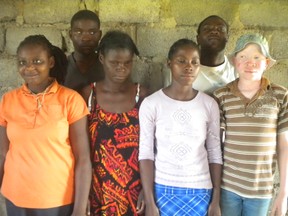 Another child at Malaikha is Nancy. Nancy is actually a young lady already since she is already 29 years old. Nancy comes from a small village in Mwanachingwala chiefdom. She turned blind when she was only six months old. Although no doctor was consulted, the parents think that she turned blind since she was suffering on small pox in the same age. Nancy never went to school before she came to Malaikha. Because the father and the mother were often out working in the fields she has spent most of her time alone at home in her hut. Unfortunately she got visitors quite often because some unruly boys in her village took advantage of her blindness and raped her several times. Therefore Nancy has already two children. It is unfortunately that blind people are easy victims for raping, especially when they are uneducated. Nancy`s father is blaming the educational system for her bad experiences.
Another child at Malaikha is Nancy. Nancy is actually a young lady already since she is already 29 years old. Nancy comes from a small village in Mwanachingwala chiefdom. She turned blind when she was only six months old. Although no doctor was consulted, the parents think that she turned blind since she was suffering on small pox in the same age. Nancy never went to school before she came to Malaikha. Because the father and the mother were often out working in the fields she has spent most of her time alone at home in her hut. Unfortunately she got visitors quite often because some unruly boys in her village took advantage of her blindness and raped her several times. Therefore Nancy has already two children. It is unfortunately that blind people are easy victims for raping, especially when they are uneducated. Nancy`s father is blaming the educational system for her bad experiences.
Of course with blind children there is a big focus on mobility and life skills but also Science is an important subject for blind children. Sciences are not easy to teach when it comes to blind children. A very old parable, which was changed and retold in all different countries in the world though it has its origin in India, shows the difficulties: It is about a very wise king who had a problem in his kingdom because there were some wise men arguing and he wanted to teach them a lesson. For this he used an elephant and six blind men. The king asked the blind men to touch the elephant and to explain how an elephant look like. The first blind man said: “An elephant looks like a pillar!” (He was touching the leg of the animal) The second man said: “The elephant looks like a rope!” (He was touching the tail of the elephant) The third man said: “An elephant looks like a tree branch!” (He was touching the trunk) The fourth blind man said: “No, an elephant looks like a hand fan!” (He was touching the ear of the elephant) The fifth man said: “An elephant just looks like a wall!” (He was touching the belly of the animal) The sixth blind man said: “The elephant looks like a solid pipe.” (He was touching the tusk).
The wise king managed to teach his lesson. All of the blind men were right since they were touching different parts of the animal. This parable is used to illustrate the principle of living in harmony with people who have different belief systems and that truth can be stated in different ways. Anyway, it also shows something else. It shows us how important it is that blind kids must get the time and the possibility to touch objects completely to understand them. A science teacher for blind kids has to be very creative. It is not always possible for blind children to touch everything therefore it is even more important to organize the Science lessons as true-to-life as possible. The nice environment at Malaikha helps to fulfil the individual goals for the children according to the curriculum. “The best and most beautiful things in the world cannot be seen or even touched. They must be felt within the heart.“ (Helen Keller)
Malaikha got registered in 2009 as an international NGO in Zambia. In the same year Malaikha conducted a survey in the area of Mazabuka to get all blind children and adults registered and started afterwards to take care at least already of the medical needs of most of the children and started offering trainings for the parents of the children to secure the best possible support at home. Although a property for the school was already available, since Malaikha got land from Chief Mwanachingwala donated, there were no actual funds for starting the buildings at the beginning. A lot of rain was delaying the start of the construction for a long time because even now the road to Malaikha is almost impossible to pass with a normal car in the rain season. So Malaikha started building blocks on a small property which was given by the local community next to the Magoye River, since at least there was enough water and river sand available to produce about 9500 blocks in the first months. The funds for the cement and labour were brought up by Barbara herself and from some donors manly from Austria, who donated each the money for one bag of cement for having their names written on one of the produced blocks. When the road was good enough, the blocks were brought to the actual school site, where the construction started by building one big hostel which is not even painted until now. Barbara also raised the funds for this building, partly out of her own pocket. By now Malaikha has some staff houses, flushing toilets and a proper shower and two classrooms which are in use, although they are not plastered yet. 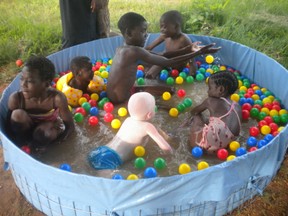 The funds for the buildings were organised by Barbara and Malaikha was lucky to find good partnership with the Nkwazi Office Supplies in Lusaka, a company which was always willing to help out with some money for materials when there were absolutely no funds available. In 2011, Malaikha got support from CIDA, the Canadian development organisation, who secured the water supply for Malaikha by finally putting up a borehole with all the necessary pipes and connections since Malaikha was really struggling by walking far for collecting water. Now in 2012, Malaikha finally got electricity with the help of the German embassy, who paid for solar electricity installed by the company Doneka.
The funds for the buildings were organised by Barbara and Malaikha was lucky to find good partnership with the Nkwazi Office Supplies in Lusaka, a company which was always willing to help out with some money for materials when there were absolutely no funds available. In 2011, Malaikha got support from CIDA, the Canadian development organisation, who secured the water supply for Malaikha by finally putting up a borehole with all the necessary pipes and connections since Malaikha was really struggling by walking far for collecting water. Now in 2012, Malaikha finally got electricity with the help of the German embassy, who paid for solar electricity installed by the company Doneka.
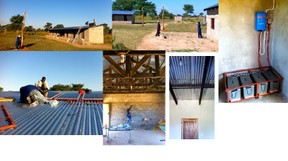 Anyway, Malaikha is still struggling a lot. They do not have enough Braille materials like Perkins Braille machines, Braille displays, Braille books and just simply Braille paper. The construction is not finished according to the plans since the school should be able to accommodate at least 100 pupils at the end. Malaikha would have enough land to have an agricultural project to secure some income for the school, but due lack of funds they cannot afford seeds and fertilizers. The number of pupils is permanently increasing and there are not enough blankets and beds and even desks and chairs for the classrooms. Malaikha would love to organize some outings for the children but there is no school bus yet to transport the children, that is also the reason why all of the kids are boarders during the week since transport cannot be available for them every day, even, if they are not staying too far from school. Most of the children have sponsors from overseas, who are paying at least a monthly amount to secure the food and medical needs for the children. The biggest problem for Malaikha is the funding of the salaries for the teachers and staff members. Barbara herself did not earn any salary since Malaikha has started and struggles a lot to find enough money every month to pay teachers and other workers. Malaikha would wish to find some companies willing to sponsor in a long term partnership providing monthly salaries for each one teacher, class assistant or other worker. That would help the school to survive since the other donated money can be put into other running costs, materials and construction. Currently the little money coming in is for salaries only and mostly even short for that, so the school cannot develop properly.
Anyway, Malaikha is still struggling a lot. They do not have enough Braille materials like Perkins Braille machines, Braille displays, Braille books and just simply Braille paper. The construction is not finished according to the plans since the school should be able to accommodate at least 100 pupils at the end. Malaikha would have enough land to have an agricultural project to secure some income for the school, but due lack of funds they cannot afford seeds and fertilizers. The number of pupils is permanently increasing and there are not enough blankets and beds and even desks and chairs for the classrooms. Malaikha would love to organize some outings for the children but there is no school bus yet to transport the children, that is also the reason why all of the kids are boarders during the week since transport cannot be available for them every day, even, if they are not staying too far from school. Most of the children have sponsors from overseas, who are paying at least a monthly amount to secure the food and medical needs for the children. The biggest problem for Malaikha is the funding of the salaries for the teachers and staff members. Barbara herself did not earn any salary since Malaikha has started and struggles a lot to find enough money every month to pay teachers and other workers. Malaikha would wish to find some companies willing to sponsor in a long term partnership providing monthly salaries for each one teacher, class assistant or other worker. That would help the school to survive since the other donated money can be put into other running costs, materials and construction. Currently the little money coming in is for salaries only and mostly even short for that, so the school cannot develop properly.
Malaikha has a donation account with the account number 0140009377701 at Stanbic Mazabuka Branch. If you want to learn more about Malaikha you can visit the homepage: www.malaikha.com or contact Barbara directly on [email protected].
Malaikha School
You might also like
Why I Shaved My HeadA month ago I shaved my head to support cancer patients and raise money for R...
The ‘Ice Bucket Challenge” – How Do You Know A Charity Is Legi...The Ice Bucket Challenge is raising lots of money for ALS, but how do you kno...
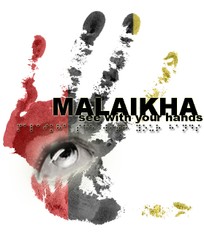

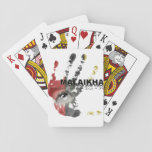
 Crafting with children: Creative plaster artworkon 07/31/2012
Crafting with children: Creative plaster artworkon 07/31/2012
 How to bake a banana breadon 06/10/2012
How to bake a banana breadon 06/10/2012
 About Visual Developmenton 05/31/2012
About Visual Developmenton 05/31/2012

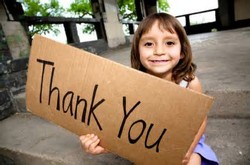
Comments
Thanks for telling us about this school. These are marvelous stories. I wish the school all the luck in getting the support it needs to continue this work.